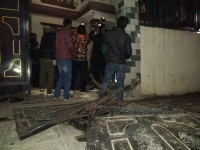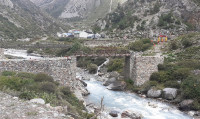National Security
Experts call for more proactive handling of new and old security threats
At a function in Kathmandu on Monday, speakers from diverse sectors discussed the interplay of regional and global powers in Nepal.
Post Report
Security and foreign policy experts have said that it is high time Nepal address various conventional and non-conventional security threats and challenges posed by digital platforms.
Speaking at a programme organised by Centre for Social Innovation and Foreign Policy (CESIF) in Kathmandu on Monday, they also discussed the interplay of regional and global powers in Nepal.
Madhu Raman Acharya, a former foreign secretary and ambassador, said that Nepal’s neighbours have a ‘security first’ mindset when dealing with Nepal.
“Our policy of non-alignment provides us a principled approach with great powers,” Acharya said. “It allows us to diversify our security practices without getting into the security blocs of bigger nations.”
National security, he added, “cannot be an isolated policy but a comprehensive one, while being coordinated with various ministries and departments of the government.”
Security analyst Geja Sharma Wagle argued that Nepal’s political parties and the government unnecessarily politicise their engagement with foreign actors.
He also urged the authorities concerned to make public the national security policy so that it can be debated. Sharma also called for using the term ‘geopolitics’ over ‘geoeconomics’ for fulfilling the larger interest of the country.
Acharya seconded the proposal to make the national security document public as it would help forge a consensus among political parties and other stakeholders. He added that major bilateral relations must be based on national interest, not on party-to-party relationships.
Major General Himalayan Thapa (Retd) stressed that Nepal must maintain neutrality in the rivalry between India and China.
Meanwhile, former lawmaker and security analyst Deepak Prakash Bhatta said that Nepal must prioritise and showcase its own environmental, developmental and strategic concerns at the world stage.
Lieutenant General Bala Nanda Sharma (Retd) said that the first national security policy led by Bhim Rawal in 2019 is not yet widely discussed in the civil society. There is a gap between the potential threats in the future and security forces’ measures to mitigate them, he said.
Akhilesh Upadhyay, former editor-in-chief of The Kathmandu Post and senior fellow at IIDS, a Kathmandu-based think tank, said that Nepal’s foreign policy is highly hill-centric and thus needs to be diversified to include all sections of the society.
Any policy discourse should encompass the people living in bordering areas and security and foreign policies of the country should cater to the needs of people living across the northern and southern borders, Upadhyay said.
Other experts spoke about the evolving nature of security challenges that Nepal is facing. They discussed the multifaceted threats demanding Nepal’s attention—from cyber vulnerabilities to climate-induced crises—and the ways to strengthen the country’s security architecture to effectively address these emerging challenges.
Rajib Subba, an IT expert, spoke about the emerging cyber security threats such as face recognition technology, disinformation and misinformation, and social media algorithms, which can pose serious challenges to Nepal’s national security.
Rajneesh Bhandari, a multimedia expert, shed light on the increasing trend of the artificial intelligence (AI) being used to spread misinformation in democracies.
Meanwhile, Batu Krishna Uprety, a climate change expert, stressed that climate change has emerged as a political and economic issue of great powers, which are contributing to dangers faced by developing countries like Nepal.
Journalist Deepa Dahal spoke about the Nepal government’s response during the COVID-19 pandemic. She said that the government was not serious during the first wave of the crisis and that indifference led it to become a pandemic in Nepal.
Ajaya Bhadra Khanal, CESIF’s research director, reflected in his opening remarks the importance of delving deeper into traditional threats, emerging security concerns and the need to build consensus on mitigating the concerns.




 20.9°C Kathmandu
20.9°C Kathmandu









